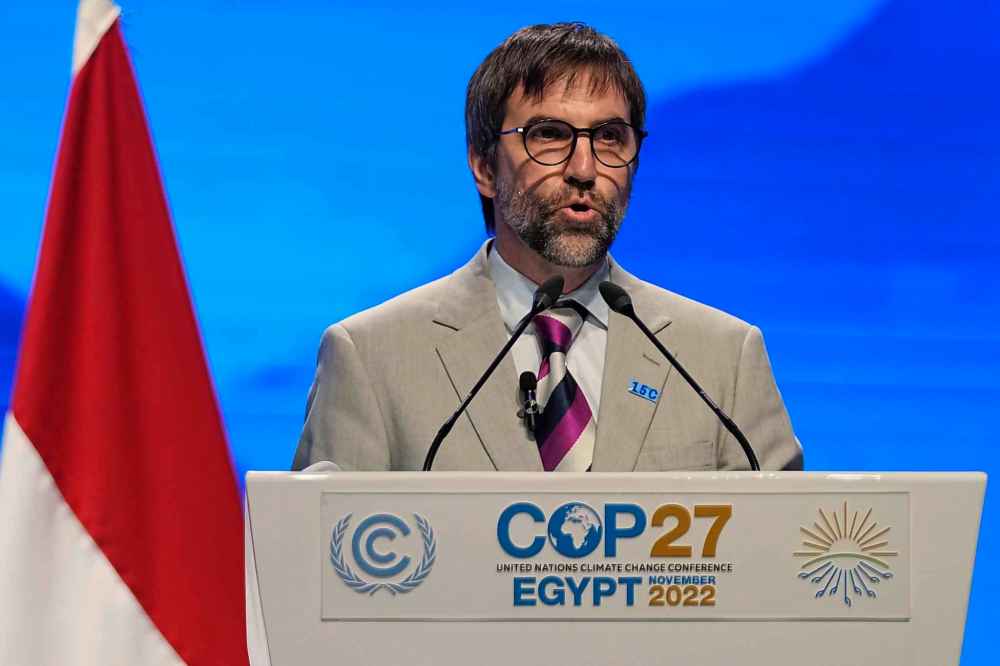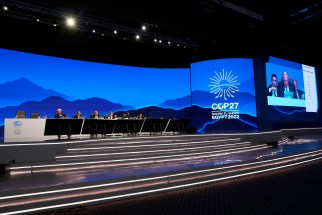COP27 moved the needle, but only very slightly
Read this article for free:
or
Already have an account? Log in here »
To continue reading, please subscribe:
Monthly Digital Subscription
$0 for the first 4 weeks*
- Enjoy unlimited reading on winnipegfreepress.com
- Read the E-Edition, our digital replica newspaper
- Access News Break, our award-winning app
- Play interactive puzzles
*No charge for 4 weeks then price increases to the regular rate of $19.00 plus GST every four weeks. Offer available to new and qualified returning subscribers only. Cancel any time.
Monthly Digital Subscription
$4.75/week*
- Enjoy unlimited reading on winnipegfreepress.com
- Read the E-Edition, our digital replica newspaper
- Access News Break, our award-winning app
- Play interactive puzzles
*Billed as $19 plus GST every four weeks. Cancel any time.
To continue reading, please subscribe:
Add Free Press access to your Brandon Sun subscription for only an additional
$1 for the first 4 weeks*
*Your next subscription payment will increase by $1.00 and you will be charged $16.99 plus GST for four weeks. After four weeks, your payment will increase to $23.99 plus GST every four weeks.
Read unlimited articles for free today:
or
Already have an account? Log in here »
Hey there, time traveller!
This article was published 25/11/2022 (1115 days ago), so information in it may no longer be current.
This year’s international climate summit was, as usual, a momentous occasion for existential bargaining.
COP27, the annual United Nations Climate Change Conference, wrapped in Egypt last weekend with some major funding commitments for the consequences of a rapidly warming world and little action on the root causes of the crisis.
World leaders appear ready to take responsibility for the damage caused by carbon emissions, while simultaneously balking at additional steps to halt said emissions.
This is not progress. Rather, it is a recipe for more, and costlier, disasters.
The Sharm el-Sheikh Implementation Plan — the cover decision signed by this year’s conference delegates — outlines a new agreement that would see developed nations with outsized carbon footprints pay developing nations for loss and damages caused by extreme weather events, such as historic floods, earthquakes and hurricanes.
Poor countries in the global south are absorbing the brunt of the crisis, despite being responsible for lower emissions than more affluent, mostly northern nations. These disproportionately impacted countries have been lobbying for climate reparations for decades.
Finally, a monumental agreement will see wealthy polluters, Canada included, held accountable for their actions. Or rather, inactions.
At the same time, the Sharm el-Sheikh plan fails to move the needle on phasing out fossil fuels. The document rehashes emission commitments from last year’s COP26 conference in Glasgow, but says nothing about hastening the renewable-energy transition — one of the keys to keeping global warming below the 2 degrees C point-of-no-return threshold.
The document itself isn’t legally binding, but without a shared objective, major polluters have no real motivation to curb their oil, gas and coal consumption. For developed countries, continuing to pump greenhouse gases into the atmosphere while racking up bills to pay for their downstream consequences makes little financial sense.
The only silver lining is that perhaps this poor cost/benefit equation will encourage action on its own. Money talks, after all.
The omission of language around fossil-fuel elimination is thanks mostly to pushback from a handful of countries, including Russia and Saudi Arabia. Until the dying hours of the conference, Canada was part of this opposition.
When the summit went into overtime, negotiators from this country joined the majority and said they would, after all, back an agreement that mentioned the phasedown of unabated fossil fuels.

That didn’t happen, but Canada’s about face — as the world’s fourth-largest oil producer — seemed like cause for celebration. The country’s stance on the issue, however, seems to have become muddied in the days since.
In a statement last week, Minister of Environment and Climate Change Steven Guilbeault pointed to the federal government’s existing commitments to get rid of fossil-fuel subsidies and eliminate coal-fired energy, but failed to say anything new about oil and gas.
While it’s true natural resources are a provincial jurisdiction, as Mr. Guilbeault has pointed out, leadership and regulation of all fossil fuels are needed if we are serious about leaving a hospitable world for future generations.
In summary, COP27 was a win for climate-change reaction and a loss for action; a win for the interests of a few and a loss for the greater good.
Canada dipped a toe on the right side of history; let’s see if policy-makers here can summon the resolve to walk the walk until next year’s conference.















